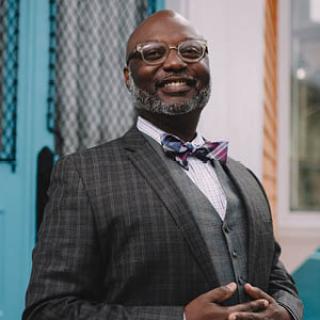As a medical student, do you ever wonder what it’s like to specialize in preventive medicine? Meet Maurice Sholas, MD, a pediatric rehabilitation physician and medical consultant, and a featured doctor in the AMA’s “Shadow Me” Specialty Series, which offers advice directly from physicians about life in their specialties. Check out his insights to help determine whether a career in physiatry might be a good fit for you.
The AMA’s Specialty Guide simplifies medical students’ specialty selection process, highlight major specialties, detail training information, and provide access to related association information. It is produced by FREIDA™, the AMA Residency & Fellowship Database®.
“Shadowing” Dr. Sholas (@docmosho)
Specialty: Pediatric rehabilitation.
Practice setting: Atypical.
Employment type: Self-employed.
Years in practice: 15.
A typical day and week in my practice: I do not actually have typical days. I spend one day per week on clinical activities. I spend two days per week on writing and communications, and the rest of the week I spend on projects consulting in the field of medical operations. My clients are individuals, hospitals, insurance companies and nonprofits. My topics include program creation, revenue cycle optimization, staffing strategies, and diversity and inclusion incorporation.
The most challenging and rewarding aspects of pediatric rehabilitation: The variety and complexity of the physical disabilities affecting my patients is a challenge. The most rewarding aspect is helping patients and families find a path to function where they thought there was none.
Three adjectives to describe the typical physiatrist: Empathic, practical and collaborative.
How my lifestyle matches, or differs from, what I had envisioned: I never dreamed that I would be a medical executive who practices a very small specialty that many have never heard of. I have always selected the path less traveled and that has been the source of great joy and originality. I feel my clinical work makes the world better one family at a time, but my consulting work affects whole systems and communities through policy and programming.
Skills every physician in training should have for pediatric rehabilitation but won’t be tested for on the board exam: We need a good grasp of neuro-anatomy as well as the musculoskeletal system. In addition, we have to apply function and physiology to a host of disease states that have effects on a child’s ability to grow, move through developmental milestones and achieve functional independence.
One question physicians in training should ask themselves before pursuing pediatric rehabilitation: Do I want a long-term relationship with a patient and family to treat a clinical situation that may not have a solution?
Books every medical student interested in pediatric rehabilitation should be reading: Pediatric Rehabilitation by Gabriella E. Molnar, MD, is our signature text. The others are pieces and parts of multiple references.
The online resource students interested in pediatric rehabilitation should follow: The American Academy of Physical Medicine and Rehabilitation Pediatrics and Developmental Disabilities Council is an excellent resource.
Quick insights I would give students who are considering pediatric rehabilitation: Find a program of size in pediatric physical medicine and rehabilitation to see if you like it (four-plus attendings in the practice group) so you can see inpatient and outpatient procedures and multiple types of patients. Small groups tend to be very boutique and not as representative of the experience.
Mantra or song to describe life in pediatric rehabilitation: “Juego con Fuego!” That is my mantra in life and everything.




